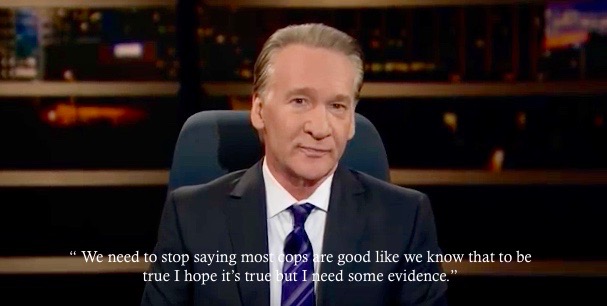Bill Maher did a segment on the Friday edition of Real Time with Bill Maher on what he felt are the unprecedented number of videos on social media depicting police brutality.
He included four video clips of recent incidents that have occurred across the country. All of the four videos were inflammatory and strike an emotional response from anyone who watches them. The Internet is great at making the exception appear to be the norm.
“If most cops are good, then why are there so many videos of them being bad? That’s a lot of videos of guys doing sh** that hardly ever happens,” Maher said. “But we also have to call men who wail on the defenseless while their buddies hold them down what they are, cowards.”
Let’s see, there are approximately 1 million police officers in the United States and around 18,000 agencies. How many contacts did they have with the public this past month? How many of those turned into a use of force, and how many of those turned into viral videos?
When a bad use of force does happen, we all have to admit it is ugly. If the use of force makes me cringe, I can only imagine the impact it has on the average person on the street. But, once again, the exception is not the norm.
Maher goes on to cite some pretty outrageous statistics, saying, “84 percent of cops say they have directly witnessed a fellow officer using excessive force and 61 percent say don’t always report serious abuse.”
That’s pretty bad, I thought. I wonder how I missed that study.
Using my graduate school research skills, I went on a hunt to find out where this information came from. A number of commentators and even a scholar or two reference the same 18-year-old National Institute of Justice study. But reading something on the internet doesn’t make it true. The problem is, that’s not what the study reported at all.
The question the study asked was: “(Do) Police officers (in your department) use more force than is necessary to make an arrest.” And 62.4 percent responded “seldom” while 21.7 percent responded “sometimes, often or always.” That’s not the same as saying they directly witnessed an officer using excessive force. This response would include anyone on the department who had been fired or disciplined for excessive force.
The study also said 61 percent of officers did not always report serious criminal violations that involve abuse of authority. The study did not specifically reference excessive force or specify the type of abuse. The number is disconcerting, but non-specific.
“We need better psychological screening to weed out the people who become cops as payback for high school…The police attracts bullies like the priesthood attracts pedophiles,” Maher said.
Wow! Way to stereotype an entire profession of 1 million people.
It’s easy to get angry at this kind of sophomoric response that is intended to foster a response. But you have to admit, Maher has a national platform. His rants are followed by millions and his audience applauded on cue at every biting comment.
Lastly, Maher said, “We need to stop saying most cops are good like we know that to be true. I hope it’s true but I need some evidence.”
Rather than sending him an email rant, I decided to send the requested evidence.
I posted a column about my dad on his Facebook page. I would estimate that 99 percent of the comments will blindly feed into his confirmation bias, but I wanted to provide the evidence he requested and let the evidence speak for itself.
I ask you do the same — wouldn’t it be great if he got more than he bargained for?
Joe is a retired police captain. He can be reached at jvargas@behindthebadgeoc.com.
 Behind the Badge
Behind the Badge



